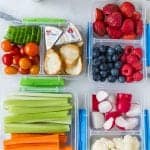 By Dr Ayesha Qureshi
By Dr Ayesha Qureshi
September is here and your kids are back in school. Whether you are a first time school parent or September marks a recurring school routine for your kids, it’s best to start the school year right and healthy. Here are some tips for parents in making the school year full of health and wellness:
- Dress fit for the weather: With change of seasons and summer temperatures dipping down, make sure to dress kids warm. It is very common for many children to get sick in the fall and one of the reasons is due to the onset of cooler temperatures that cause some viruses to flourish. Helpful tip: Be prepared and pack an extra sweater, socks and scarf at your child’s school and keep warm.
- Get your child a good backpack: wide, padded and doubled shoulder bags are the way to go! Avoid
 single shoulder bags that may strain your child’s shoulder. Carrying a heavy bag incorrectly can cause your child to develop poor posture and have muscle strains. It is recommended that backpacks not be hung too low, no more than 3-4 inches below the waistline to balance out the weight of the bag.
single shoulder bags that may strain your child’s shoulder. Carrying a heavy bag incorrectly can cause your child to develop poor posture and have muscle strains. It is recommended that backpacks not be hung too low, no more than 3-4 inches below the waistline to balance out the weight of the bag.
- Establish healthy dietary habits
- Wholesome lunch ideas: Wholegrain sandwiches made with lettuce, tomatoes and choice of organic meat (chicken, turkey, salmon, tuna, eggs
- etc), bean vegetable chilly, variety of soups, avocado turkey wrap, quinoa and wholegrain pasta.
- Healthy snacks: Reduce the sugar load! High sugar consumption in children and adolescence can
 be associated with increased dental cavities, hyperactivity, weakened immunity and chronic colds
be associated with increased dental cavities, hyperactivity, weakened immunity and chronic colds
, and increased risk of obesity and diabetes later on in life. “The American Heart Association has issued itsrecommendations on added sugar, urging parents to make sure children between 2 and 18 are eating fewer than six teaspoons per day.” Healthy snack ideas: mixed fruit and vegetables, hummus with carrot, cucumbers, celery sticks, whole grain granola bars, popcorn and whole grain crackers + cheese. Limit consumption of chocolate bars, candy and chips – healthy eating habits start young! Be sure to check with your child’s school and make sure there aren’t any classmate allergies before packing their lunches!
- Make sure your child is staying hydrated: Many children during school hours consume very little
 water and consume more sugary juices and pop instead. Did you know that on average, your human body is about 60% water. Water is essential for cellular function, makes up many body fluids, regulates body temperature, provides moisture to mucosal membranes, flushes body waste, lubricates joints and is the most abundant component of articular cartilage. Lack of water can also contribute to constipation in many children among other factors. The amount of water your child needs depends on their age and weight. Set a goal with your child and follow up daily on their water consumption.
water and consume more sugary juices and pop instead. Did you know that on average, your human body is about 60% water. Water is essential for cellular function, makes up many body fluids, regulates body temperature, provides moisture to mucosal membranes, flushes body waste, lubricates joints and is the most abundant component of articular cartilage. Lack of water can also contribute to constipation in many children among other factors. The amount of water your child needs depends on their age and weight. Set a goal with your child and follow up daily on their water consumption.
- Does your child need supplementation?
- Vitamin D: According to Stats Canada (2015), about 32% of Canadians had vitamin D inadequacy
 with 40% having vitamin D inadequacy in the winter months. Low vitamin D levels have been linked with poor bone mineralization and skeletal deformities, muscle pain, asthma, low immunity, risk of cardiovascular disease among more. Sources of vitamin D include egg yolk, fish (salmon, sardines, tuna etc), mushrooms and fortified dairy products. Limited sun exposure and having darker pigmented skin can put you at risk of vitamin D deficiency. Talk to your Naturopathic Doctor or healthcare provider to see if you are getting an adequate amount of vitamin D and if supplementation may be necessary.
with 40% having vitamin D inadequacy in the winter months. Low vitamin D levels have been linked with poor bone mineralization and skeletal deformities, muscle pain, asthma, low immunity, risk of cardiovascular disease among more. Sources of vitamin D include egg yolk, fish (salmon, sardines, tuna etc), mushrooms and fortified dairy products. Limited sun exposure and having darker pigmented skin can put you at risk of vitamin D deficiency. Talk to your Naturopathic Doctor or healthcare provider to see if you are getting an adequate amount of vitamin D and if supplementation may be necessary.
- Probiotics and immune support: The gut has a strong influence on your immune system. Keeping your gut healthy is an essential step in keeping your whole body healthy! Incorporating probiotics in the diet is one recommendation I often tell my patients to help improve their gut. Probiotics are live bacterial organisms that are beneficial to your overall health. There are many factors that can affect the gut such as poor dietary habits, stress and medications. Antibiotics for example not only kill the bad bacteria but they also destroy the good bacteria in the gut. Probiotics will help restore the balance. Probiotic foods include pickles, yogurt, kefir, sauerkraut and tempeh. Probiotic supplementation may also be helpful in many cases such as constipation. Talk to your healthcare provider or Naturopathic Doctor and see which strain and dosage is right for your child!
- Botanical herbs: There are a number of botanical herbs that are immune stimulating and strengthening. These include Astragalus, Codonopsis and Echinacea. These herbs are often used more preventatively than during an active infection. Be sure to discuss with your health practitioner if these herbs are right for your child. These herbs would not replace the need for antibiotics, if needed.
- Ensure your child is getting good quality sleep. It is generally recommended that children and
 adolescents should get 8-10 hours of sleep daily. Setting a bedtime and establishing a bedtime routine can be helpful in getting quality sleep.
adolescents should get 8-10 hours of sleep daily. Setting a bedtime and establishing a bedtime routine can be helpful in getting quality sleep.
- Manage stress and anxiety: No matter what the age is, school can be stressful and anxiety provoking for many. Stress can lead to many health ailments and impact the immune system. Good communication with your child can help create an open discussion. Mindfulness and breathing exercises can also help. Extracurricular activities are important but keep in mind not to over schedule your child!
 single shoulder bags that may strain your child’s shoulder. Carrying a heavy bag incorrectly can cause your child to develop poor posture and have muscle strains. It is recommended that backpacks not be hung too low, no more than 3-4 inches below the waistline to balance out the weight of the bag.
single shoulder bags that may strain your child’s shoulder. Carrying a heavy bag incorrectly can cause your child to develop poor posture and have muscle strains. It is recommended that backpacks not be hung too low, no more than 3-4 inches below the waistline to balance out the weight of the bag. be associated with increased dental cavities, hyperactivity, weakened immunity and chronic colds
be associated with increased dental cavities, hyperactivity, weakened immunity and chronic colds water and consume more sugary juices and pop instead. Did you know that on average, your human body is about 60% water. Water is essential for cellular function, makes up many body fluids, regulates body temperature, provides moisture to mucosal membranes, flushes body waste, lubricates joints and is the most abundant component of articular cartilage. Lack of water can also contribute to constipation in many children among other factors. The amount of water your child needs depends on their age and weight. Set a goal with your child and follow up daily on their water consumption.
water and consume more sugary juices and pop instead. Did you know that on average, your human body is about 60% water. Water is essential for cellular function, makes up many body fluids, regulates body temperature, provides moisture to mucosal membranes, flushes body waste, lubricates joints and is the most abundant component of articular cartilage. Lack of water can also contribute to constipation in many children among other factors. The amount of water your child needs depends on their age and weight. Set a goal with your child and follow up daily on their water consumption. with 40% having vitamin D inadequacy in the winter months. Low vitamin D levels have been linked with poor bone mineralization and skeletal deformities, muscle pain, asthma, low immunity, risk of cardiovascular disease among more. Sources of vitamin D include egg yolk, fish (salmon, sardines, tuna etc), mushrooms and fortified dairy products. Limited sun exposure and having darker pigmented skin can put you at risk of vitamin D deficiency. Talk to your Naturopathic Doctor or healthcare provider to see if you are getting an adequate amount of vitamin D and if supplementation may be necessary.
with 40% having vitamin D inadequacy in the winter months. Low vitamin D levels have been linked with poor bone mineralization and skeletal deformities, muscle pain, asthma, low immunity, risk of cardiovascular disease among more. Sources of vitamin D include egg yolk, fish (salmon, sardines, tuna etc), mushrooms and fortified dairy products. Limited sun exposure and having darker pigmented skin can put you at risk of vitamin D deficiency. Talk to your Naturopathic Doctor or healthcare provider to see if you are getting an adequate amount of vitamin D and if supplementation may be necessary. adolescents should get 8-10 hours of sleep daily. Setting a bedtime and establishing a bedtime routine can be helpful in getting quality sleep.
adolescents should get 8-10 hours of sleep daily. Setting a bedtime and establishing a bedtime routine can be helpful in getting quality sleep.